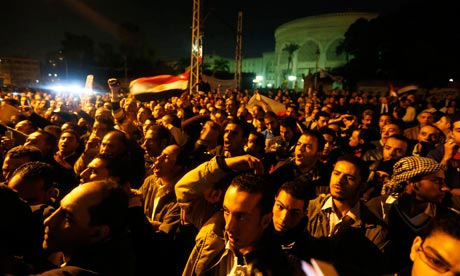
Egypt's IMF loan deal postponed after Mohamed Morsi scraps tax...
Egypt's IMF loan deal postponed after Mohamed Morsi scraps tax increases
Political crisis deepens as judges refuse to oversee referendum on new constitution proposed by president

Protesters gather in front of the presidential palace in Cairo. Photograph: Petr David Josek/AP
An International Monetary Fund loan to Egypt has been delayed until next month, intensifying the political crisis gripping the country, it was announced on Tuesday.
The announcement of the delay came as judges voted decisively against overseeing Saturday's referendum on a controversial new constitution. In a further sign of the seriousness of the country's political stalemate the defence minister in charge of Egypt's military, Abdel-Fatah el-Sissi, called for a "national dialogue meeting" on Wednesday to try to find consensus between the Muslim Brotherhood and opposition groups.
The delay in the $4.8bn (£3bn) loan, which was agreed last month, occurs amid mounting protests against the government, which has faced accusations that it is behaving in an authoritarian fashion by issuing decrees and attempting to push through a new constitution.
As rival factions gathered in Cairo for more demonstrations, the finance minister, Mumtaz al-Said, said the delay in the loan agreement was intended to allow time to explain a heavily-criticised package of economic austerity measures to the Egyptian people.
"Of course the delay will have some economic impact, but we are discussing necessary measures [to address that] during the coming period," the minister told Reuters, adding: "I am optimistic … everything will be well, God willing."
Egypt's president, Mohamed Morsi, on Monday backed down on planned tax increases, which are seen as vital for the loan to go ahead, within hours of their being announced.
Opposition groups, already angry over other measures taken by Morsi, had greeted the tax measures, which included duties on alcoholic drinks, cigarettes and a range of goods and services, with furious criticism.
The main opposition bloc, the National Salvation Front (NSF), is to decide on Wednesday whether to boycott the referendum or campaign for a no vote.
The latest bout of unrest has so far claimed seven lives in clashes between the Muslim Brotherhood and opponents who are also besieging the presidential palace.
The elite Republican Guard, which protects the palace, has yet to use force to keep protesters away from the graffiti-daubed building, now ringed with tanks, barbed wire and concrete barricades.
The army has told all sides to resolve their differences through dialogue, saying it would not allow Egypt to enter a "dark tunnel".
For the period of the referendum, the army has been granted police powers by Morsi, allowing it to arrest civilians.
However in the latest reversal for Morsi, the presidency was forced on Tuesday to clarify that anyone arrested by the army would face civil rather than military courts.
The military has portrayed itself as the guarantor of the nation's security but so far it has shown no appetite for a return to the frontline political role it played after the fall of the country's former leader Hosni Mubarak, which severely damaged its standing.
Morsi and his key allies in the Muslim Brotherhood have stumbled through a series of worsening crises since he was praised for his key role in mediating a ceasefire in Gaza between Israel and Hamas.
In the immediate aftermath Morsi granted himself sweeping new powers that saw the biggest demonstration in Egypt since the revolution almost two years ago that ousted Mubarak.
In continuing street violence, masked men attacked a sit-in in the early hours of Tuesday morning, firing birdshot at the protesters.

 The Guardian
The Guardian